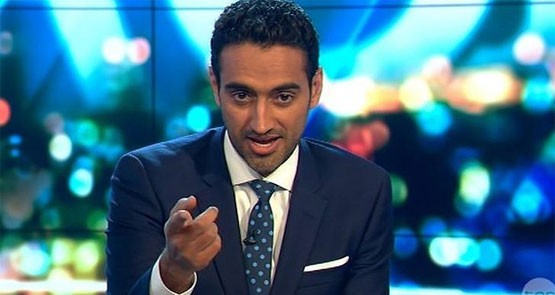
Academic-turned-TV host Waleed Aly, a finalist for the Gold Logie, shouldn’t win the gong because television isn’t diverse enough and we need more intelligent debate on our screens, according to a bizarre article in The Daily Telegraph that Crikey can only hope is satire.
The article, listing six reasons Aly shouldn’t win, was written by News Corp journo Victoria Hannaford. She opines that the gong should go to someone like Leigh Sales and points to Aly’s “bias” (“One minute, Aly’s professing journalistic neutrality … and the next, he’s editorialising about terrorism”), the fact that his show, The Project, isn’t as popular as breakfast television, and that he’s not on social media as reasons why he should not win the Gold Logie.
Aly’s academic expertise is in terrorism. The Project isn’t popular? It airs in prime time and easily out-rates both the leading commercial breakfast shows, Sunrise and Today. As for the fact that Aly isn’t on social media, it’s ironic this criticism was made today, as yesterday’s Daily Telegraph carried comment from an anonymous “TV insider” who said that this year’s nominees were all there because of their popularity on social media rather than anything good they’d done on television.
That Tele story on Tuesday had a “well-placed insider” complain that an editorial comment “slapping someone down every now and then” shouldn’t qualify Aly for a Gold Logie. “And is The Project successful? No.” The Project’s supposed lack of success hasn’t stopped Aly co-host Carrie Bickmore from winning the Gold Logie last year (she’s nominated again this year). Another TV insider was quoted by the Tele as saying the Logies came down to the quality of social media campaign a show could run — another of this year’s nominees, Lee Lin Chin, has a popular Twitter account run for her by The Feed’s Chris Leben.
Chin and Aly’s nominations mark the first time two broadcasters of such visibly non-white heritage have been nominated for the Gold Logie. In previous years, the award has been almost exclusively the domain of Caucasian TV stars (though for three years between 2001-2006, Greek Cypriot actress Ada Nicodemou was a nominee).
Japanese-Australian ABC broadcaster Kumi Taguchi said on her public Facebook page that she found the article “very hard to digest”:
“From where I sit, Waleed Aly’s and Lee Lin Chin’s nominations simply echo their rise and popularity in an increasingly diverse media world …
“But when people feel threatened they say crappy things, so I thought I’d take a look at the past 20 years of Gold Logie winners to see if there was any trend. There is one. And it doesn’t take much to see it.
“So, if we want to debate the legitimacy of someone’s award based on the colour of their skin then yes, this year is different. Only because there’s a more realistic representation of Australia in those faces, white and non-white. How good do they look all together?”
Despite all the public commentary, voting for the Gold Logie has been closed since January 17. The Logies voting system works by TV shows nominating their talent. TV Week readers then vote on their favourites, including for the Gold Logie, from those put forward. The top six are the “nominees”, and the winner is whoever has the most votes when voting closes in January, TV Week editor Emma Nolan explained to Crikey.
More details of the process are contained in a delightfully titled article in TV Week: “Are the Gold Logie nominees rigged?” They aren’t, TV Week says, adding that no, the mag’s three staff do not just pick the winners themselves.








Alleged “Academic”-turned-TV host Waleed Aly was a joke as an academic who was better suited to clowning in front of a television camera than he was pretending to be an academic.
Well if Carrie Bickmore can win the goldie then the bar is pretty low. She seems to be a nice person & does what she does well but really………….
As for Lee Lin Chin. What does she do apart from read the news on SBS and look/dress eccentrically? Maybe she is more prominent but I missed it?
I suppose Waleed should be happy about being nominated but it really is a nothing gong. He’s better than that.
I can’t imagine their self-esteem being threatened by not winning the gold logie, or by a white female journalist’s criticisms of their nominations.
But the Project is somewhere near wildly successful, I would have thought. A quite different news program, directed to a younger audience, that has stuck around, and at worst has produced some pretty good TV.
I’m not in their demographic, but apart from things like ‘The Beast’ and ‘Hungry something or other’, current affairs is stuck in a time warp from the 80’s. At least these shows have made an effort.
What have they done to deserve nomination? Well, they managed to get voted on the nominations- just like every other nominee over the years.
Why them? Why not
I wish Lee Lin and Waleed every success. They seem to be as deserving (or more deserving) than most previous nominees.
@Norman
Instead of a constructive rebuttal you choose character assassination?
Your comments are a waste of electrons.